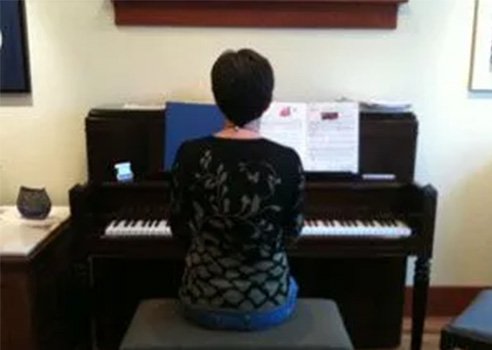Word count: 753 words
Reading time: About 3 minutes
There are some funny similarities between writing and practicing piano….
I desperately wanted piano lessons as a child. Too bad for me my parents couldn’t afford them. Instead, I watched enviously as my classmates carried their music books under their arms and marched off to meet their piano teachers. Why couldn’t I do that?
When I was 20, I took up the flute. I still would have preferred piano, but there was no way I could squish one into my apartment.
But when my triplets started lessons at age 5 — we had a house and piano at this point — I joined them. The trouble was, as a very busy parent who also ran a business, I just didn’t have any time for piano practicing. I quit after six weeks.
Fast forward 13 years and now I’m trying again. This time, I think it’s going to take. And, funnily enough, I bet my piano-related suggestions, here, will help you improve your writing:
1) Be specific and concrete about your goals. I could have said I want to play piano, just as you might say, “I want to be a better writer. But what, exactly does this mean? It’s way too vague! Now, I’m saying that I want to be able to play the grade 6 repertoire for Royal Conservatory. Be as specific as possible about what you want to accomplish.
2) Allow the necessary time for your practice. I call this the Goldilocks strategy because just as porridge can be too hot or too cold, any sort of practice can be too little or too much. If it’s too little you won’t improve and if it’s too much you’ll regularly feel you’re entitled to take a “break” from your practice.
Singer Tony Bennett, at the age of 86, still practices singing every day. If he skips a day, he says he notices it. If he skips two days, he says his band notices. And if he skips three days, he says his audience notices. I set a kitchen timer for 15 minutes and try to practice for two back-to-back chunks. If I’m really tired or fed up, I allow myself to quit after just 15. But most days I do 30. How much time do you spend writing?
3) Try to practice at the same time of day. You’ll find me practicing piano every night directly after dinner. (This works because I have few social engagements right now and I’m able to reschedule for the occasional conflict. If we were social butterflies, however, I’d pick a different time.) When it comes to writing, the very best time is almost always first thing in the morning. In fact, that’s still when I do most of my own writing.
4) Give yourself regular rewards for practice. I’m convinced that none of us rewards ourselves nearly enough for the work we do. Sure, we may reward ourselves for accomplishments but don’t you think you should also be recognized for the day-in, day-out slogging? So, set your schedule and give yourself a weekly reward for meeting it. The reward doesn’t have to be expensive – a book, a magazine, even a latte can be enough. The important thing is the recognition.
5) Concentrate ONLY on your immediate goals. Right now, I’m learning how to read the bass clef (the part you play with your left hand.) But if I look at or listen to some of the complicated music my 18-year-old children play, it’s really easy for me to freak myself out. How will I ever be able to play a Chopin etude? It feels impossible for me to coordinate my left hand with my right! How does anyone even count all those crazy sixteenth and thirty-second notes?
Fortunately, my teacher is very calm and has me proceed in a slow and orderly way. Anything she gives me to do is only a little bit difficult, but always conquerable with a modest amount of practicing piano. Similarly, you should not start off wanting to sound like Ian McEwan (assuming he’s a writer you admire.) It takes thousands of hours of practice to reach that level. But, of course, the term “thousands of hours” is daunting. So, instead, focus on the three to seven hours you can accomplish this week.
If you write seven hours per week, you’ll accumulate 364 hours in a year. That means you’ll hit 1,000 hours in about three years.
You’ll do that a whole lot faster than I’ll be able to hit grade 6 in piano. Get going!


